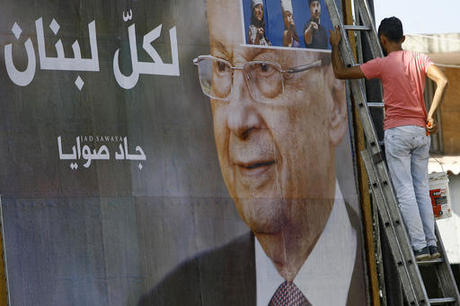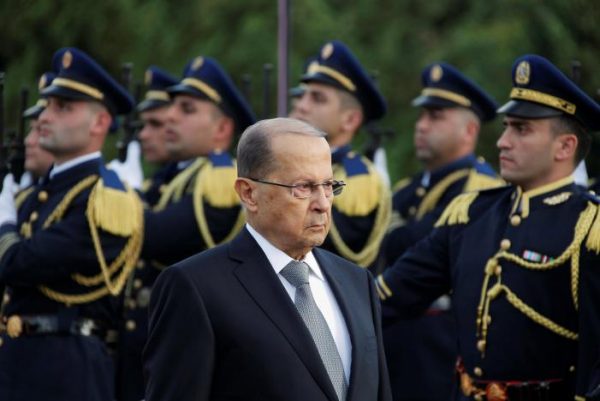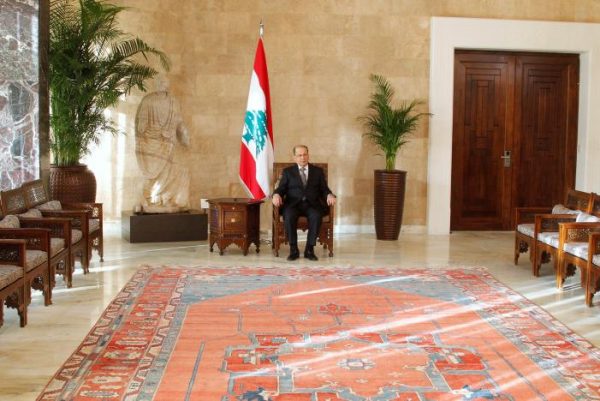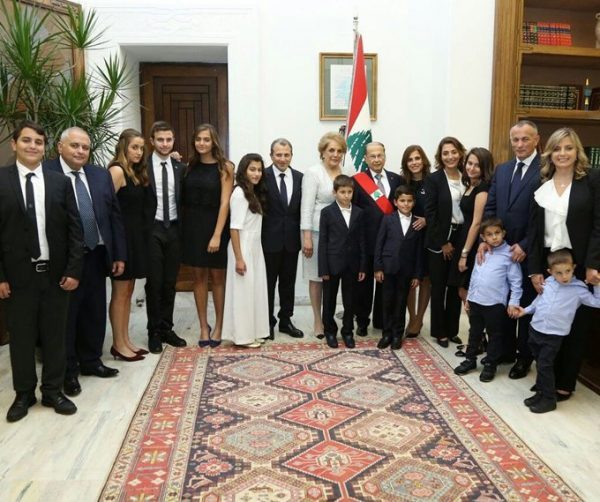
The Lebanese presidential election went to a 4th round on Monday when former army chief Michel Aoun failed to secure the necessary two-thirds majority support in parliament in the first round to win it in the first round.
Aoun secured the votes of 84 MPs in the first round, two short of the 86 needed to win. He only requires an absolute majority of 65 votes in the 127-seat parliament to win in the second round ( The parliament is supposed to be 128 members but one passed away) .
But there was a mixup in the number of ballots handed out to the MPs . 128 ballots were handed out instead of 127 .
In the fourth round Aoun won 83 votes . There were 36 white ballots ( intended for Maraud Movement leader Suleiman Franjieh) and 8 were voided
Lawmakers showed up for their 46th attempt to elect a president but the first expected to actually produce a result.
Ambassadors and diplomats from different countries, including the Syrian , Iranian and american Ambassadors attended the meeting.
Security was tight around the parliament and Beirut’s Martyrs Square, where supporters of Aoun’s Free Patriotic Movement (FPM), dressed in their trademark orange, have been gathering for days.
The 81-year-old former general has long eyed the presidency, and his candidacy was backed by the Iranian backed Hezbollah movement, his ally since a surprise rapprochement in 2006.
But the key to clinching the post has been the shock support of two of his greatest rivals: Samir Geagea, leader of the Christian Lebanese Forces, and Sunni former premier Saad Hariri.
Hariri described his endorsement of Aoun as necessary to “protect Lebanon, protect the (political) system, protect the state and protect the Lebanese people”.
The streets of the capital were emptier than usual ahead of the vote, with most schools and universities closed, but Aoun’s supporters were out in force.
A “dream (that) has come true “
“We’re counting the minutes until General Aoun is elected, we’ve waited a long time,” said Jean, a 35-year-old hairdresser in the Dekwaneh neighborhood outside Beirut.
“I’m going to close the salon after he’s elected and go to downtown Beirut to participate in the celebrations which will last until dawn,” he told AFP.
In the Jdeideh suburb of Beirut, dozens of supporters dressed in orange waved pictures of the stern-looking Aoun, as his party’s anthems blared from loudspeakers.
“We have won. Lebanon has returned to us,” said Indira Georges Alwan, dressed in orange.
The anticipated election was also being celebrated in Syria, despite Aoun’s historical antipathy to Damascus.
He once waged a war to push Syrian forces out of Lebanon, but in 2006 joined hands with Hezbollah, a key ally of Damascus that has dispatched fighters to bolster the regime against a rebellion.
“The resistance axis has triumphed, Syria and its allies in Lebanon have triumphed,” trumpeted the Al-Watan daily, which is close to the government.
Nicholas Sehnaoui, Lebanon’s former minister of telecommunications and a member of Aoun’s FPM, echoed many supporters in describing the election as a “dream (that) has come true.”
“He will be a president for all the Lebanese, not just his party,” he told AFP.
– Blank ballots in protest –
Sehnaoui expressed hope Aoun would be elected in a first round vote in the parliament, which would require him to win a two-thirds majority of 86 lawmakers.
If he fails to secure that, the vote will go to a second round, where he needs only a 50-percent-plus-one majority of 65 votes, a figure he seems to be assured.
His biggest adversary in parliament will be speaker Nabih Berri, who has said the 13 votes from his Amal party will not go to Aoun.
Ali Khreis, an MP in Berri’s bloc, told AFP he would cast a blank ballot in protest at the horsetrading that secured Aoun’s candidacy.
“A blank ballot is an objection to the way things were done, a method that I think is wrong. This country doesn’t run on bilateral or trilateral agreements — we believe in dialogue,” he said.
Aoun is expected to nominate Hariri to return as prime minister, leading some to describe his support for the ex-general as a tit-for-tat.
Aoun’s detractors have ramped up criticism of him ahead of the vote, accusing him of allying with whoever will help advance his interests.
In footage posted by an opponent, Aoun is heard railing against the same parliament set to elect him on Monday as an “illegitimate” body because it has twice extended its own mandate.
While Aoun’s election will end a vacuum seen as damaging for the country, experts say it is unlikely to resolve the underlying disagreements that kept the post empty for so long..
In his first speech after he was elected Aoun called for pursuing an independent foreign policy to protect Lebanon, an agreement on a new electoral law and for a strong Lebanese army to protect the nation.
What changed?
Saad Hariri’s decision to change course came after an agreement was reached between him and Michel Aoun.
Few details are known about the terms of the deal, apart from a pledge to appoint Mr Hariri as prime minister in exchange for him dropping his opposition to Mr Aoun’s candidacy.
In Lebanon, a newly elected president appoints a prime minster following consultations with MPs. The prime minister then starts the task of forming a new cabinet.
But what prompted Saad Hariri’s change of heart? There is no simple answer, though several explanations have been circulating.
One was offered by Mr Hariri himself, who spoke of a “sacrifice to save the state from total collapse”.
The presidential vacuum had developed into a legislative crisis when parliament ceased to pass laws after a large group of MPs decided that electing a president should take priority over any other vote.
It has also deeply affected the work of the cabinet, which was caught in disputes over how to proceed with decision-making in the absence of the head of state, who has the right to preside over the cabinet sessions.
Another explanation put forward concerns the financial and political problems of Mr Hariri, a billionaire whose business interests in Lebanon and abroad are reported to be in deep trouble.
Mr Hariri is facing mounting anger from unpaid staff and a crisis in overdue loans, amid uncertainty about the future of his companies. He also faces an increasingly unhappy and disappointed popular base that feels neglected and ignored by its leader.
In this context, his endorsement of Michel Aoun might have been his only way back to the office of prime minister, and therefore a chance to salvage his leadership.
‘New era’
In an interview given to a local TV channel, Mr Hariri seemed confident of international backing for what he called a “new era” for Lebanon.
He was speaking as a senior Saudi envoy was visiting the country and conveying a message of support to Lebanon, regardless of the identity of the new president.
The message was interpreted as a signal that Saudi Arabia would not oppose the choice of Michel Aoun, though many Lebanese are still trying to decode the Saudi rationale.
Although the political vacuum is now ended, another issue is fast becoming a concern – whether Saad Hariri will be able to form an inclusive and workable cabinet.
He is already facing stiff opposition from Nabih Berri, the Shiite speaker of parliament and one of the most powerful politicians in the country.
Marriage of convenience
Mr Berri was opposed to the Aoun-Hariri deal and has clearly stated he will not take part in the coming government.
While common ground might have been found between the different players, the reality is that a new government would be at best a marriage of convenience among parties with major differences, not least in their support for rival sides in the wars raging in the region, and thus, might be seriously tested very soon.
The president has finally been elected but the crisis might not be over.
Not 100% made in Lebanon
Speaker Nabih Berri slammed reports claiming that the agreement to elect MP Michel Aoun was a hundred percent Lebanese decision and said that it was “probably” the result of an Amercian-Iranian deal,” al-Akhbar daily reported on Monday.
Berri told the daily that the agreement was definitely not a result of an understanding among the Lebanese parties, “it was probably the result of an Amercian-Iranian settlement,” he said.
“The visit of the Saudi State Minister for Gulf Affairs Thamer al-Sabhan was only a supplementary visit because the agreement has been already drawn,” added Berri.
Reports said that Sabhan’s visit to Beirut, who arrived Thursday for talks with Lebanese officials, meant that a Saudi green light has been given to end the vacuum at the presidential post, which Berri has slammed and attributed to an agreement between the US and Iran.
On whether the Speaker will be joining the government, he said: “Until this moment I am in the ranks of the opposition… I will sit and watch, lets see what they have to offer.”
Sources reported that Berri is asking for the lion’s share. He reportedly is demanding the Ministries of Energy, Finance, Oil and Public works
Difficult path
Aoun has not had an easy path to the presidential palace. The “impossible” was made possible by Hariri’s approval to back Aoun for the presidency.
The doors of Baabda Palace, which have been closed since former President Michel Suleiman’s tenure ended in May 2014, will open again today
In his efforts to reach Lebanon’s top post, Aoun waged bloody and cruel wars. He also carried out reconciliations that challenge the logic of politics. The result was in his favor after the last obstacle to his path to Baabda Palace was dissipated.
Aoun’s presidential dream began in September 1989 when former President Amin Gemayel illegally appointed him as prime minister to a six-member interim military government after the parliament failed to elect a new president.
But the country fell into more chaos as a result of the presidential vacuum and the resignation of half of the government’s members. The rival government of Prime Minister Salim al-Hoss continued to control large parts of Lebanon.
Aoun then moved to Baabda Palace and controlled Beirut’s eastern sector.
According to Free Patriotic Movement officials, Aoun had contacts with Syria before and after his appointment as prime minister of the interim military cabinet.
Elie Mahfoud, a former FPM official, said that Aoun had sent an envoy to meet with then Syrian President Hafez al-Assad. The message that Aoun sent to Assad was clear in asking the Syrian leader to consider him “a small officer in his army.”
He said in the message that “we should legitimize its (Syria’s) military presence in Lebanon to confront any possible attack against it.”
Despite Mahfoud’s claims, FPM sources strongly denied the presence of such a letter, telling Asharq Al-Awsat that the intentions of the people behind such rumors are known.
The sources stressed that “Aoun’s history is pure as snow.”
After all efforts failed to reach a political settlement, Aoun declared a Liberation War against Syria that failed to make huge geographic changes but led to destruction and war on both sides of the Green Line that separated East and West Beirut.
Aoun later decided to impose his authority on the rest of the Lebanese territories after he rejected the Taef Accord, which was signed by Lebanese deputies in Saudi Arabia, under an Arab and international sponsorship. But fierce fighting in East Beirut broke out in 1990 between the two sides. It was called the Elimination War.
Geagea joined the parties that backed the implementation of the Taef agreement, and Aoun’s military influence became limited to Baabda Palace and the southern sector of Mount Lebanon.
When Aoun refused to abide by international agreements, the Syrian regime received the “green light” to invade the general’s area of influence. On the morning of October 13, 1990, Syrian warplanes entered Beirut’s airspace for the first time to bomb the presidential palace and army bases that fell under Aoun’s control.
Aoun then fled to the French embassy from where he instructed his units to follow the orders of Army commander Gen. Emile Lahoud who had been appointed by the Hoss government.
He then went into exile in France.
The French Exile
During his presence in France, Aoun worked hard to end Syria’s hegemony over Lebanon. He was a main backer of the Syria Accountability Act, a bill of the United States Congress passed into law on December 12, 2003.
Resolution 1559 that was adopted by the U.N. Security Council in 2004 came against the backdrop of the Syria Accountability Act, said former MP Ghattas Khoury.
According to an old voice recording the FPM founder described Syria as a terrorist state and criticized Hezbollah as an extension of the Iranian regime.
The confrontation between Aoun on one side and Syria and Hezbollah on the other drew to a close following the end of the neighboring country’s hegemony on Lebanon.
Syria withdrew from Lebanon in April 2005 following the assassination of former Prime Minister Rafik Hariri( in February 2005) , paving the way for Aoun’s return to Lebanon after a 15-year exile.
Fireworks

Fireworks echoed across Beirut as the tally showed Aoun the winner. Aoun, an MP, was shown smiling in his seat..


Sources: several agencies
More to follow

Leave a Reply
You must be logged in to post a comment.